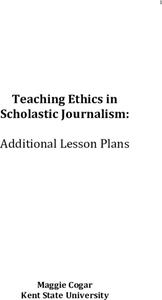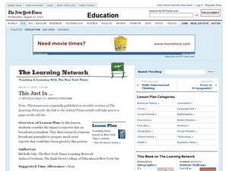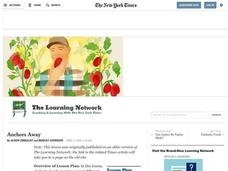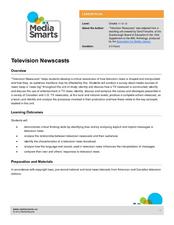PBS
Broadcast News
Just because a story is on the news doesn't mean it's being presented fairly. Analyze news broadcasts with a instructional activity focused on evaluating television journalism. At home, kids watch a news show and note the stories...
Media Smarts
The Broadcast Project
As part of a unit on media studies, kids are asked to chart their viewing habits, observe the advertising that sponsors their favorite shows, and then to imagine what they would broadcast if given a block of airtime.
Carolina K-12
World War II through the Radio Waves
Young historians channel the very medium used to convey news during World War I. They create and present a five-minute radio broadcast on a particular topic from the war, such as the roles of African Americans and women, war bonds,...
iCivics
Lesson 1: Journalism
Extra! Extra! Do your pupils know what it takes to be a good journalist? Young news hounds explore the world of journalism through a series of activities that focus on ethical reporting. Learners read, evaluate, and investigate popular...
Kent State University
Teaching Ethics in Scholastic Journalism
Events in recent years have underscored the importance of a free and independent press in a democracy. Young journalists engage in lessons about the function of journalism in a democratic society, practice the steps of Bok's Ethical...
Curated OER
This Just In…
Students consider the impact a reporter has on broadcast journalism. They research a famous broadcast journalist to prepare a mock news report.
Curated OER
Anchors Away
Students examine forms of broadcast journalism. they identify roles played by journalists in various news formats.
Newseum
Use ‘War of the Worlds’ to Teach Media Literacy
Orson Welles' 1938 radio broadcast of "War of the Worlds" is the focus of a lesson that looks at the importance of clarity in broadcasting. After listening to the radio broadcast, class members discuss the ethical obligations to...
PBS
Finding Story Ideas
Pitch your best news story to your news team, or the peers in your journalism class, with a activity about finding, reporting, and presenting a story. After watching clips of different examples, as well as strategies for finding the best...
News Literacy Project
News Goggles: Corrections and Clarifications: Accuracy and Correcting the Record
Accuracy and fairness are key principles in journalism. It is the responsibility of reputable news organizations to correct their stories when new information is found. Viewers learn to spot these corrections and clarifications through a...
Curated OER
Newscast From An Ancient City
Seventh graders produce a newscast from an Ancient Roman city. In this journalism and history lesson, 7th graders work in groups to dramatize a historical event from the Roman Empire. students sequence the events, role-play, and create...
Curated OER
Television Newscasts
When we watch news broadcasts on television, we receive a much more visual perspective than when we read the newspaper. How do sets, clothing, and music contribute to our understanding of the story? Compare American and Canadian news...
Facing History and Ourselves
Hands Up, Don't Shoot!
Why is it so difficult to develop a clear understanding of the events surrounding the shooting of Michael Brown by a Ferguson, Missouri, police officer? To answer this question class members listen to a NPR discussion of the findings of...
Media Smarts
Violence on Television
Focus on a specific incident of violence on television in the case of the Canadian Broadcast System showing Silence of the Lambs on public television. Look at the broadcasting codes and a complaint that was filed against the Association....
Rockefeller Archive Center
Understanding Mass Media News
In an age of fake news and photoshopped images, it is vital that 21st century learners development the skills they need to evaluate mass media and assess its validity. A great way to launch such a study is with a carefully crafted lesson...
Curated OER
News Broadcasts
Learners create a news broadcast after studying example broadcasts about disaster relief organizations. In this broadcast news lesson, students research disaster relief organizations and then write a news broadcast related to a disaster....
Newseum
Is It Fair?
Young journalists learn how to analyze word choice, context, and counterpoints to judge the fairness of a news story. They practice using these tools to judge a series of headlines for the story of Goldilocks and the Three Bears. They...
Media Smarts
The Citizen Reporter
Ripped from the headlines! Discuss topical social issues like racism, discrimination, and diversity while exploring the concept of citizen journalism. Begin with a professional-looking presentation on the history of citizen journalism....
Curated OER
The Weekly News, Part 2
Sixth graders use articles they've previously written to produce a school news broadcast. In this journalism lesson, 6th graders discuss the goals of a news broadcast and use previously written articles to plan a news broadcast. Students...
News Literacy Project
News Goggles: Conflicts of Interest in News Reports
Nineteen slides use the story of Chris Cuomo of CNN and his refusal to discuss his brother, New York governor Andrew's political troubles, to inform viewers about the idea of conflict of interest in journalism.
Newseum
The Fundamentals of News
A short video introduces middle schoolers to different media-related news terms. Viewers then complete a worksheet and discuss the differences between news and journalism, between facts and opinions.
Curated OER
Show Me the Money!!!
Students research employment rates in the United States with a focus on broadcast journalists. In this employment rate lesson, students visit the given websites to explore popular states to live in, highest and lowest unemployment rates,...
Carolina K-12
The Major Conferences of World War II
Young historians create a 1940's news radio broadcast on the five major World War II conferences, including the Atlantic, Casablanca, Tehran, Yalta, and Potsdam.
Pulitzer Center
Food Insecurity
Food insecurity, whether as a result of food scarcity or a lack of nutritious food, is a growing and serious problem in the world today. After discussing the concept of food insecurity, learners listen to an NPR radio broadcast on the...
Other popular searches
- Radio Broadcast
- Broadcast Advances
- Broadcast News
- Broadcast Media
- Teach Broadcast Journalism
- Broadcast Journalism Ethics
- Broadcast Journalism Writing
- 1920s Radio Broadcast
- Broadcast Journalism in War
- Radio Broadcast Script
- Broadcast Journalism Video
- Broadcast Video Production

























